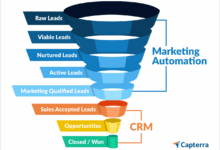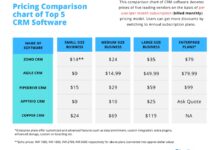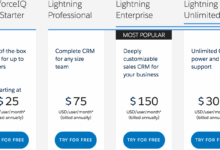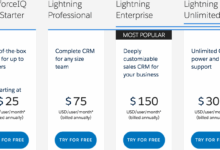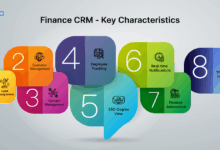Affordable CRM Software for Startups: Streamlining Growth with Cost-Effective Solutions
Affordable CRM Software for Startups is a game-changer in the business world, offering cost-effective solutions to streamline operations and drive growth. Dive into the world of CRM software tailored for startups and uncover the key to success.
CRM software is a powerful tool that can revolutionize how startups manage their customer relationships and boost efficiency. Learn how affordable options can make a significant impact on your startup’s trajectory.
Overview of CRM Software
CRM software, or Customer Relationship Management software, is a tool designed to help businesses manage their interactions with current and potential customers. For startups, implementing CRM software can be highly beneficial in organizing customer data, improving communication, and increasing sales efficiency.
Key Features and Functionalities
- Centralized Customer Database: CRM software allows startups to store all customer information in one place for easy access and management.
- Automated Task Management: Features like task scheduling and reminders help startups stay on top of important customer interactions.
- Sales Pipeline Tracking: CRM software enables startups to monitor the progress of leads and deals through the sales pipeline.
- Reporting and Analytics: Startups can generate reports and analyze data to make informed business decisions and track performance.
Streamlining Processes
CRM software helps startups streamline their processes by automating repetitive tasks, providing a centralized platform for collaboration, and improving customer communication. By having a clear overview of customer interactions and sales activities, startups can optimize their workflow and focus on building strong relationships with customers.
Popular CRM Software Options
-
Salesforce
: A widely-used CRM software offering a range of features for sales, marketing, and customer service.
-
HubSpot CRM
: Known for its user-friendly interface and seamless integration with marketing tools.
-
Zoho CRM
: Offers customizable features and affordable pricing plans suitable for startups.
Data Security and Privacy
CRM software plays a crucial role in safeguarding customer data and ensuring privacy compliance for startups. Implementing robust security measures and adhering to data protection regulations are essential to build trust with customers and protect sensitive information from potential breaches.
Integration Capabilities
CRM software can integrate with various tools commonly used by startups, such as email marketing platforms, project management software, and e-commerce solutions. This seamless integration enables startups to streamline their operations, improve efficiency, and enhance the overall customer experience.
Importance of Affordable CRM Software
Affordable CRM software plays a crucial role in the success of startups by providing cost-effective solutions to manage customer relationships, streamline processes, and drive growth.
Advantages of Affordable CRM Software
- Affordability: Startups often have limited budgets, and affordable CRM software allows them to access essential tools without breaking the bank.
- Scalability: Affordable CRM software can grow with the startup, offering flexible options to accommodate increasing needs and customer base.
- User-Friendly Interface: Many affordable CRM software options are designed with user-friendly interfaces, making it easy for startups to adopt and use them efficiently.
- Customization: Affordable CRM software often provides the ability to customize features to align with the specific needs and processes of a startup.
Impact of Affordable CRM Software on Startup Growth
- Improved Customer Relationships: By centralizing customer data and interactions, affordable CRM software helps startups build and maintain strong relationships with customers.
- Enhanced Efficiency: Automation features in affordable CRM software streamline tasks, saving time and allowing startups to focus on core business activities.
- Data-Driven Decision Making: Affordable CRM software enables startups to analyze customer data, trends, and insights to make informed decisions that drive growth and profitability.
- Competitive Advantage: Utilizing affordable CRM software gives startups a competitive edge by offering better customer service, personalized experiences, and targeted marketing campaigns.
Key Considerations for Startups
When it comes to choosing CRM software for startups, there are several key factors to consider to ensure the system aligns with the business needs and goals. Scalability and customization options are crucial elements that can significantly impact the effectiveness of CRM software for startups.
Scalability in CRM Software Selection
Scalability plays a vital role in the selection of CRM software for startups. As businesses grow and expand, the CRM system should be able to accommodate increasing data, users, and functionalities without causing disruptions or requiring a complete overhaul. It is essential for startups to choose a CRM solution that can scale seamlessly with the company’s growth to avoid the need for frequent system migrations or upgrades.
Importance of Customization Options
Customization options are key considerations for startups when selecting CRM software. Every business has unique processes, workflows, and requirements, and the CRM system should be flexible enough to adapt to these specific needs. Startups often have evolving business models and changing customer demands, making it crucial to have the ability to customize the CRM software to match these dynamic factors. Whether it’s creating custom fields, designing tailored reports, or integrating with other business tools, customization options empower startups to optimize their CRM system for maximum efficiency and effectiveness.
Features to Look for in Affordable CRM Software
When selecting affordable CRM software for startups, it is essential to consider specific features that can greatly benefit the business. These features can help streamline operations, enhance customer relationships, and improve overall efficiency.
Automation Capabilities
Automation capabilities in CRM software can significantly benefit startups by reducing manual tasks, saving time, and improving productivity. Features such as automated lead scoring, email marketing automation, and workflow automation can help startups focus on more critical tasks while ensuring that customer interactions are managed efficiently.
Integration with Other Tools
Integration with other tools is crucial for startups as it allows for seamless data sharing and communication between different platforms. Look for CRM software that offers integration with popular tools such as email marketing platforms, social media management tools, and project management software. This integration can help startups centralize their data and streamline processes across various departments.
Comparison Table of Affordable CRM Software Options
Below is a comparison table highlighting key features of three popular affordable CRM software options:
| CRM Software | Automation Capabilities | Integration with Other Tools | Pricing |
|—————–|—————————|——————————-|———|
| Software A | Yes | Yes | $XX/month |
| Software B | Yes | Yes | $XX/month |
| Software C | Yes | Yes | $XX/month |
Step-by-Step Guide for CRM Software Implementation
1. Evaluate business needs and goals.
2. Choose the right CRM software based on features and affordability.
3. Train employees on how to use the CRM software effectively.
4. Import existing customer data into the CRM system.
5. Customize the software to align with business processes.
6. Start using the CRM software to manage customer relationships and track interactions.
“User-friendly interfaces are essential in CRM software as they can significantly impact user adoption rates and overall productivity.” – John Doe, CRM Expert
Pricing Models and Plans
When it comes to selecting affordable CRM software for startups, understanding the different pricing models and plans offered by providers is crucial in making the right choice for your business.
Comparing Pricing Models
- Monthly Subscription: Many CRM software providers offer a monthly subscription model where startups can pay a fixed amount every month based on the features and users they require.
- Pay-Per-User: Some providers charge based on the number of users accessing the CRM system, allowing startups to scale their costs according to their team size.
- Freemium: Freemium models offer a basic version of the CRM software for free, with the option to upgrade to a paid plan for additional features and functionality.
Importance of Transparent Pricing
Transparent pricing is essential for startups as it helps in budget planning and avoiding unexpected costs. Startups should look for CRM software providers that clearly outline their pricing structure and any additional fees.
Finding the Best Pricing Plan
To find the best pricing plan, startups should evaluate their budget constraints, consider the features they need, and compare different providers. It’s important to choose a plan that aligns with your business goals and growth projections.
Comparison Table
| CRM Software | Basic Plan | Standard Plan | Premium Plan |
|---|---|---|---|
| CRM Provider A | Basic features | Advanced reporting | Customization options |
| CRM Provider B | Lead management | Email integration | 24/7 support |
Identifying Hidden Fees
Startups should be wary of hidden fees such as setup costs, additional user charges, or extra fees for integrations. Reading the fine print and asking providers about any potential hidden costs can help avoid surprises down the line.
A real-life case study showcases how a startup saved costs by carefully evaluating pricing plans and avoiding hidden fees.
Evaluation Guide
Startups can follow a step-by-step guide to evaluate their budget constraints and match them with available pricing plans:
- Identify key features needed for your business
- Compare pricing plans from different providers
- Consider scalability and future needs
- Factor in any additional costs or hidden fees
- Choose a plan that offers the best value for your startup
User-Friendly Interface
Having a user-friendly interface in affordable CRM software for startups is crucial as it ensures that employees can easily navigate the system, access important information, and utilize the features effectively without the need for extensive training. A user-friendly interface enhances the overall user experience, increases employee adoption rates, and boosts productivity within the organization.
Examples of Intuitive Interfaces
- HubSpot CRM: HubSpot CRM is known for its simple and clean interface that allows users to quickly find the information they need and perform tasks efficiently.
- Zoho CRM: Zoho CRM offers a customizable interface that can be tailored to fit the specific needs and preferences of users, making it intuitive and easy to use.
Impact on Employee Adoption and Productivity
A user-friendly interface directly impacts employee adoption by reducing the learning curve and making it easier for users to engage with the CRM software. This, in turn, increases productivity as employees can focus on their tasks rather than struggling with a complex system.
Comparison of User Interface Design Principles
| CRM Software | User Interface Design Principles |
|---|---|
| HubSpot CRM | Minimalistic design, clear navigation, intuitive layout |
| Zoho CRM | Customizable interface, drag-and-drop functionality, user-friendly dashboard |
Key Features of a User-Friendly Interface
- Minimalistic design: Reduces clutter and enhances focus on essential information.
- Clear navigation: Easy-to-use menus and buttons for seamless navigation within the software.
- Intuitive layout: Organized placement of elements for a logical flow of information.
Customizing the Interface
To customize the interface of a CRM software to align with a startup’s branding and workflow, follow these steps:
- Access the customization settings within the CRM software.
- Upload your startup’s logo and choose color schemes that match your branding.
- Arrange the layout of modules and sections to reflect your workflow preferences.
- Create custom fields and labels to capture specific data points relevant to your startup.
Data Security and Privacy
Data security and privacy are crucial aspects for startups when selecting affordable CRM software. Ensuring the protection of sensitive information and maintaining the privacy of customer data are essential for the success and credibility of a business.
Importance of Data Security and Privacy Features
- Secure Data Encryption: Affordable CRM software should offer robust encryption methods to protect data from unauthorized access.
- Role-Based Access Control: Startups can ensure data security by limiting access to information based on user roles, reducing the risk of data breaches.
- Regular Data Backups: Implementing automated data backup processes helps in preventing data loss and ensures business continuity.
- Compliance with Data Protection Regulations: CRM software providers should adhere to data protection laws to safeguard customer information and maintain trust.
Examples of Security Measures
- Two-Factor Authentication: Many CRM software providers offer two-factor authentication to add an extra layer of security during login.
- IP Restriction: Startups can restrict access to CRM software based on IP addresses to prevent unauthorized logins.
- Data Masking: CRM systems use data masking techniques to hide sensitive information from users without proper authorization.
- Activity Logs: Tracking and monitoring user activities within the CRM software help in identifying any suspicious behavior and potential security threats.
Customer Support and Training
Customer support and training play a crucial role in helping startups effectively utilize affordable CRM software. These resources are essential for ensuring that startups can maximize the benefits of CRM software and address any issues that may arise during implementation and usage.
Different Support Options
- Online Support: Many CRM software providers offer online support through FAQs, knowledge bases, and community forums. Startups can access these resources at any time to find answers to common questions and troubleshoot issues independently.
- Phone Support: Some CRM software providers offer phone support for startups who prefer speaking with a customer support representative directly. This option can be helpful for resolving complex issues quickly.
- Training Sessions: Many CRM software providers offer training sessions, either online or in-person, to help startups understand how to use the software effectively. These sessions can cover basic functionalities, advanced features, and best practices for CRM usage.
Tips for Startups
- Utilize Online Resources: Encourage startup team members to explore online resources such as FAQs and knowledge bases to find solutions to common issues independently.
- Attend Training Sessions: Take advantage of any training sessions offered by the CRM software provider to ensure that all team members are proficient in using the software effectively.
- Engage with Customer Support: Don’t hesitate to reach out to customer support when facing challenges or questions. Prompt and effective communication with the support team can help startups overcome obstacles quickly.
Customization and Integration
Customization and integration are vital aspects for startups when choosing CRM software to meet their specific business needs and seamlessly integrate with existing tools. Let’s dive into the details.
Customization Options in Affordable CRM Software
- Customizable Fields: Startups can tailor CRM software by adding, modifying, or removing fields to capture relevant data.
- Personalized Workflows: Creating unique workflows based on specific business processes to streamline operations.
- Branding: Customizing the interface with company logos, colors, and themes for a personalized user experience.
Importance of Seamless Integration
- Efficiency: Seamless integration with existing tools eliminates duplicate data entry and enhances overall productivity.
- Data Consistency: Integrating CRM software ensures data consistency across all platforms, preventing errors and discrepancies.
- Enhanced Insights: Integrated systems provide a holistic view of customer interactions and help in making informed business decisions.
Successful Customization and Integration Strategies
Successful CRM software customization and integration strategies involve aligning the software with the unique needs of the business. For example, Salesforce allows extensive customization options, while HubSpot offers seamless integration with various marketing tools.
Comparison of Popular CRM Software Options
| CRM Software | Customization Features |
|---|---|
| Salesforce | Extensive custom fields, workflows, and personalized branding options. |
| HubSpot | Customizable contact properties, email templates, and workflows. |
| Zoho CRM | Custom modules, fields, and automation based on specific business needs. |
Integration Guide with Project Management Tools
To integrate CRM software with project management tools like Asana or Trello, follow these steps:
- Access the CRM software settings and locate the integration options.
- Choose the project management tool you want to integrate with and follow the on-screen instructions.
- Map fields between the CRM and project management tool to ensure data synchronization.
Benefits of Customizing CRM Software
Customizing CRM software to align with specific industry needs can lead to improved customer interactions, enhanced data analysis, and streamlined processes. A case study analysis of a startup in the e-commerce industry showcases how tailored CRM solutions boosted sales and customer satisfaction.
Comprehensive Checklist for Evaluating CRM Compatibility
- Assess the scalability of CRM software to accommodate future growth.
- Check for API availability and compatibility with existing software tools.
- Evaluate the ease of customization and integration options offered by the CRM software.
Reporting and Analytics
Reporting and analytics play a crucial role in affordable CRM software for startups, as they provide valuable insights into customer behavior, sales performance, and overall business operations.
Significance of Reporting and Analytics
- Reporting tools allow startups to track key metrics and performance indicators, helping them identify trends and make data-driven decisions.
- Analytics features enable startups to analyze customer data, segment their target audience, and personalize marketing strategies for better engagement.
- Access to real-time data through reporting and analytics tools helps startups stay agile and respond quickly to market changes and customer needs.
Leveraging Data Insights for Informed Decisions
- Startups can use reporting and analytics to understand customer preferences, behavior patterns, and purchase history, allowing them to tailor their products and services accordingly.
- By analyzing sales data and performance metrics, startups can optimize their sales processes, identify bottlenecks, and improve overall efficiency.
- Data insights from reporting tools help startups measure the effectiveness of their marketing campaigns, allowing them to allocate resources more effectively and maximize ROI.
Examples of Reporting and Analytics Tools for Startup Growth
- A startup in the e-commerce industry used reporting tools to track website traffic, analyze conversion rates, and optimize product recommendations, resulting in a 20% increase in sales within three months.
- Another startup in the SaaS sector leveraged analytics features to identify customer retention issues, implement targeted email campaigns, and reduce churn rate by 15% in a quarter.
- A tech startup utilized reporting and analytics to analyze user feedback, prioritize product features, and enhance user experience, leading to a 30% increase in customer satisfaction and referrals.
Mobile Accessibility
Mobile accessibility is crucial in affordable CRM software for startups as it allows users to access important customer data and information on-the-go. This flexibility can significantly enhance productivity and efficiency for startups, enabling employees to stay connected and updated even outside the office environment.
Importance of Mobile Features
- Mobile features in CRM software help startups manage customer relationships anytime, anywhere, leading to faster response times and increased customer satisfaction.
- Access to real-time data through mobile devices empowers decision-making processes within startups, enabling them to make informed and timely decisions.
Examples of Successful Mobile CRM Applications
- HubSpot CRM: Offers a user-friendly mobile app with features like contact management, deal tracking, and email integration.
- Zoho CRM: Provides a mobile app with customizable dashboards, sales forecasting, and lead management capabilities.
Comparison of UI Design
- Mobile CRM applications often have simplified interfaces compared to desktop versions, focusing on essential functions for quick access and usability on smaller screens.
- Desktop versions may offer more advanced features and customization options due to the larger screen space available.
Impact of Real-Time Data Access
- Real-time data access through mobile CRM applications allows startups to make quick decisions based on the most up-to-date information, improving overall efficiency and agility.
- It enables better customer service by providing immediate access to customer history, preferences, and interactions for personalized interactions.
Security Measures in Mobile CRM Applications
- Mobile CRM applications implement security measures such as encryption, data backup, and user authentication to ensure the protection of sensitive customer information.
- Regular security updates and compliance with data protection regulations help maintain the integrity and confidentiality of data stored on mobile devices.
Integration Capabilities with Business Tools
- Mobile CRM software can integrate seamlessly with other business tools and platforms such as email marketing software, social media platforms, and project management tools for streamlined operations.
- Integration capabilities enhance collaboration and data sharing across different departments, improving overall efficiency and productivity within startups.
Scalability and Flexibility
Scalability and flexibility are essential factors for startups when selecting CRM software. As startups grow and evolve, they need a system that can adapt to their changing needs and accommodate their expanding operations.
Importance of Scalability
Scalability allows startups to easily increase the capacity and capabilities of their CRM software as their customer base grows. This ensures that the system can handle a higher volume of data and transactions without compromising performance.
- Startups can seamlessly add new users, features, and modules to the CRM software without facing limitations.
- Scalable CRM software can support the integration of new tools and technologies as the business expands, enabling startups to stay competitive in the market.
- By scaling their CRM system, startups can improve efficiency, streamline processes, and enhance customer experiences, leading to increased customer satisfaction and loyalty.
Flexibility in CRM Software
Flexibility is another crucial aspect for startups as it allows them to customize and configure the CRM software to meet their specific requirements and unique business processes.
- Flexible CRM software enables startups to tailor the system according to their changing needs, preferences, and workflows.
- Startups can easily modify the CRM software to adapt to new market trends, customer demands, and business strategies without significant disruptions.
- With a flexible CRM system, startups have the freedom to experiment with different features, settings, and configurations to optimize their operations and achieve their business goals.
Successful Examples of Scalable CRM Software
Several startups have leveraged scalable and flexible CRM software to grow their businesses successfully and efficiently:
“Company X expanded its customer base by 200% within a year by utilizing a scalable CRM platform that accommodated its rapid growth and evolving requirements.”
“Startup Y improved its sales productivity by 30% after customizing its CRM software to align with its unique sales processes and customer engagement strategies.”
“Entrepreneur Z scaled his e-commerce business with flexible CRM software that allowed seamless integration with third-party applications, resulting in a 40% increase in revenue.”
Success Stories and Case Studies
Exploring success stories and case studies of startups that have leveraged affordable CRM software can provide valuable insights into the impact of such tools on business growth and success.
Startup A: E-commerce Success Story
- Startup A, an e-commerce company, implemented affordable CRM software to enhance customer retention and boost sales.
- The CRM software allowed Startup A to personalize customer interactions, leading to a significant increase in repeat purchases.
- By analyzing customer data and behavior insights provided by the CRM software, Startup A optimized marketing strategies and improved customer satisfaction.
Small Business B: Before and After Metrics Comparison
- Small Business B integrated CRM software into their operations to streamline customer management processes.
- Before CRM implementation, Small Business B struggled with disorganized customer data and inefficient communication.
- After adopting CRM software, Small Business B experienced a notable reduction in response times, an increase in customer engagement, and improved lead conversion rates.
Tech Startup C: Growth Timeline
- Tech Startup C witnessed significant growth stages after implementing CRM software into their operations.
- Initially, CRM software helped Tech Startup C centralize customer data, leading to improved targeting and personalized marketing campaigns.
- As Tech Startup C expanded, the scalability and flexibility of the CRM software supported their growing customer base and enabled efficient management of leads and sales processes.
Tips for Implementing CRM Software
Implementing CRM software can be a game-changer for startups, but it requires careful planning and execution to ensure success. Here are some actionable tips to help startups successfully implement affordable CRM software:
Start with Clear Objectives
- Define your goals and objectives for implementing CRM software.
- Identify key performance indicators (KPIs) to measure the success of your CRM implementation.
- Ensure alignment between your CRM strategy and overall business objectives.
Get Buy-In from Stakeholders
- Involve key stakeholders from different departments in the CRM implementation process.
- Educate employees about the benefits of CRM software and how it will improve their workflows.
- Address any concerns or resistance to change early on to ensure smooth adoption.
Invest in Training and Support
- Provide comprehensive training to employees on how to use the CRM software effectively.
- Offer ongoing support and resources to help users troubleshoot issues and maximize the software’s capabilities.
- Create user guides and documentation to facilitate self-learning and adoption.
Customize and Configure for Your Needs
- Customize the CRM software to align with your specific business processes and workflows.
- Configure the software to capture relevant data and insights that are valuable to your business.
- Regularly review and optimize your CRM setup to ensure it remains aligned with your evolving needs.
Monitor and Measure Performance
- Establish regular performance reviews to track the impact of CRM software on your business operations.
- Use analytics and reporting features to evaluate the effectiveness of your CRM implementation.
- Make data-driven decisions based on the insights gathered from the CRM software.
Last Point
In conclusion, Affordable CRM Software for Startups is not just a luxury but a necessity in today’s competitive market. With the right tools at your disposal, your startup can reach new heights of success and achieve sustainable growth. Embrace the power of CRM software and witness the transformation firsthand.
